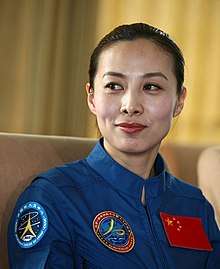Wang Yaping
Colonel Wang Yaping (born January 27, 1980[2]) is a Chinese military pilot and astronaut.[3] Wang was the second female astronaut to be named by the CNSA, and the second Chinese woman in space.
Wang Yaping | |
|---|---|
 | |
| Born | April 1978 or January 1980 |
| Space career | |
| CNSA Astronaut | |
| Rank | Colonel, PLASSF |
| Selection | Chinese Group 2[1] |
| Missions | Shenzhou 10 |
Mission insignia | |
| Wang Yaping | |||||||||
|---|---|---|---|---|---|---|---|---|---|
| Traditional Chinese | 王亞平 | ||||||||
| Simplified Chinese | 王亚平 | ||||||||
| |||||||||
Career
In September 1991, she entered junior high school in Yantai, and in 1994 she entered Yantai Yizhong High School and graduated from high school in 1997. She was admitted to the Changchun Flight Academy of the People's Liberation Army Air Force and joined the army in August 1997. Wang Yaping is the seventh female military pilot in China. As a pilot of the Wuhan Air Force transport aircraft crew, she has participated in many major tasks such as combat readiness exercises, the Wenchuan Earthquake Relief, and the Beijing 2008 Olympic Games to eliminate clouds and reduce rain. After accumulating safe flights for 1600 hours, she was named Air Force Class II pilot. In May 2010 she officially became the second astronaut in China. At that time Wang was a captain in the People's Liberation Army Air Force.[4]
She was a candidate for the space mission Shenzhou 9 in 2012.[5] However, Liu Yang was selected over her for the historic mission of the first Chinese female space traveller.[6] Wang was a member of the backup crew for SZ-9.[7]
Wang became the second Chinese female astronaut as a member of the Shenzhou 10 spaceship crew, which orbited the Earth in June 2013,[8] and of the Tiangong-1 orbiting space station with which it docked.[9] She was known as the “Goddess II”. She was the first member of the crew announced, in April, while the remainder of the crew were announced in June.[7] Wang Yaping was one of two women in space on the 50th anniversary of Vostok 6, the first spaceflight by a woman, Valentina Tereshkova. The other woman in space on 16 June 2013 was Karen Nyberg, an American astronaut aboard the International Space Station.[10] While aboard Tiangong-1, Wang conducted scientific experiments and taught a physics lesson to Chinese students by live television broadcast.[11] She now holds the rank of Air Force Colonel who can fly four aircraft models. [12]
Wang Yaping was elected for a five-year-term as a deputy to the National People's Congress (NPC) in March 2018.[13]
Personal life
According to the official Shenzhou 10 report, Wang Yaping's birth date is stated as January 1980, which is incongruent with that of the Shenzhou 9 report. In the previous report, her birth date was April 1978.[14]
Wang is married, which one former official claimed is required for all women who are part of the Chinese space program due to concerns that spaceflight could potentially harm women's fertility.[15][6] However, this requirement has been officially denied by the director of the China Astronaut Centre, stating that this is a preference but not a strict limitation.[16][17]
References
- Xinhua (2011-10-31). "China mulls over sending female "taikonauts" into space". Xinhua.
- Identity of one of the Chinese female taikonaut candidates revealed NASAspaceflight.com
- Becker, Joachim. "Taikonaut (yuhangyuan) Biography: Wang Yaping". Spacefacts.de. Retrieved 11 April 2018.
- "China readies three taikonauts for station visit". Planetary Society.
- Space.com, "China Unveils Astronaut Crew, 1st Female Spaceflyer, for Saturday Launch", 15 June 2012, Clara Moskowitz
- Morris Jones (3 April 2013). "Shenzhou's Shadow Crew". Space Daily.
- William Harwood (June 25, 2013). "Chinese astronauts complete space mission, return to Earth". CBS News. Retrieved October 15, 2013.
- "China to launch Shenzhou-10 manned spacecraft on June 11". Xinhua. June 10, 2012. Retrieved June 10, 2012.
- Ken Kremer (16 June 2013). "Cosmonaut Valentina Tereshkova; 1st Woman in Space 50 Years Ago! Ready for Mars". Universe Today.
- Clark, Stephen (11 June 2013). "Successful start for China's fifth human spaceflight". Spaceflight Now. Retrieved 11 June 2013.
- https://xw.qq.com/cmsid/20180315A0FN1D00
- Andrew Jones. "Space exploration requires the 'efforts of generations' says Chinese astronaut Wang Yaping". GB Times.com. Retrieved August 1, 2019.
- "Female Astronaut - Shenzhou 9 Docking Mission with Tiangong-1". China Network Television. Retrieved June 11, 2013.
- Brenhouse, Hillary (25 March 2010). "China's Female Astronauts: Must Be a Married Mom". TIME.
- "For Liu Yang, sexism is still the final frontier". Archived from the original on June 20, 2012. Retrieved June 17, 2012.
- "Exclusive interview: Astronauts selection process". CCTV News. CNTV. June 16, 2012. Archived from the original on December 13, 2014. Retrieved June 17, 2012.